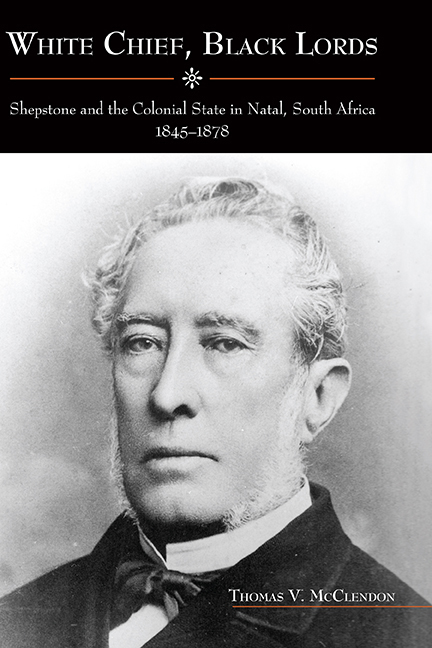Book contents
- Frontmatter
- Dedication
- Contents
- List of Illustrations
- Acknowledgments
- List of Abbreviations
- 1 Introduction
- 2 The Man Who Would Be Inkosi
- 3 Witchcraft and Statecraft
- 4 You Are What You Eat Up
- 5 Guns, Rain, and Law
- 6 From Show Trial to Shallow Reform
- 7 Conclusion
- Notes
- Glossary
- Bibliography
- Index
- Rochester Studies in African History and the Diaspora
5 - Guns, Rain, and Law
Published online by Cambridge University Press: 09 May 2017
- Frontmatter
- Dedication
- Contents
- List of Illustrations
- Acknowledgments
- List of Abbreviations
- 1 Introduction
- 2 The Man Who Would Be Inkosi
- 3 Witchcraft and Statecraft
- 4 You Are What You Eat Up
- 5 Guns, Rain, and Law
- 6 From Show Trial to Shallow Reform
- 7 Conclusion
- Notes
- Glossary
- Bibliography
- Index
- Rochester Studies in African History and the Diaspora
Summary
No doubt the young men at Langalibalele's resented this action on the part of Mahoyiza and, by influencing their father [Langalibalele], caused things to come to a crisis.
John Kumalo, in James Stuart ArchiveIn late October 1873, a messenger named Mahoyiza arrived at ePhangweni, the great place of the Hlubi inkosi Langalibalele, to deliver an ultimatum from Theophilus Shepstone. When Mahoyiza returned to the seat of the local magistracy, Estcourt, a few days later, he gave the SNA a sensational account of his visit, claiming that he had been mistreated and gravely insulted by the inkosi and his men. As Mahoyiza approached the inkosi's kraal, he was brought into the presence of a group of the chiefdom's leading men. According to the messenger's body-servant, “Now all those amadoda [men] were carrying assegais and shields; the young men were all mounted on horses, carrying assegais in sheaves on their backs … with powder horns upon their shoulders.” Shepstone's version of Mahoyiza's report was even more lurid. “When they arrived, they found a large force of armed men, guns, assegais, and battle axes—guns all loaded.” Before he was prodded into the inkosi's presence at spear-point, Mahoyiza claimed, he was forced to “strip” and appear “naked” before the inkosi.
These charges accelerated the growing dispute between the colonial government and the inkosi, which quickly degenerated into a celebrated colonial crisis and imperial embarrassment. In early November, fearing an imminent attack, Langalibalele and his men drove their cattle over the Khahlamba passes into Basutoland. A pursuing force encountered a group of the Hlubi men and a skirmish ensued in which five men on the colonial side were killed, causing even greater alarm in a settler population already in a state of panic about what they saw as Langalibalele's preparations for open rebellion. In the aftermath of this event, the inkosi was deposed, and he and many of his followers were arrested and tried, the chiefdom was broken up, its homesteads looted and burned, and its people assigned to work for settlers.
- Type
- Chapter
- Information
- White Chief, Black LordsShepstone and the Colonial State in Natal, South Africa, 1845–1878, pp. 82 - 107Publisher: Boydell & BrewerPrint publication year: 2010

